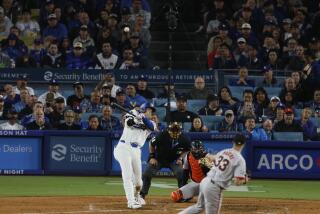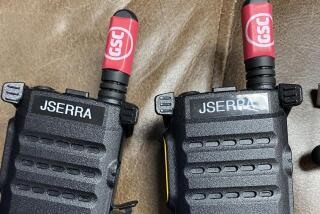Titanium Bats Mostly Marketing Tools
The recent decision by the National Federation of State High Schools Assns. that allows baseball players to use titanium bats has amounted to much ado about very little titanium.
The “titanium” bats manufactured by Van Nuys-based Easton Sports are actually aluminum bats with graphite cores containing thin strands of titanium not much wider than a hair. The strands help stabilize the bat’s core but do not affect its performance, according to Jim Darby, vice president of promotions for Easton Sports. Darby acknowledged the titanium label is primarily a marketing tool.
“No one is going to have an advantage with the titanium bat,” said Elliot Hopkins, baseball rules editor for the NFSHSA. “It still meets the same criteria [as other types of bats].”
The March 22 decision allowing the use of titanium bats that meet the ball-exit-speed ratio performance standard merely expedited a previous NFSHSA ruling that had paved the way for them to become legal effective Jan. 1, 2003.
There was some confusion earlier in the season because some BESR-stamped bats also had the word “titanium” imprinted on their shafts. Ken Allan, rules interpreter for the California Baseball Umpires Assn., said there was one instance in which a double protest was filed after a game because both teams had used titanium bats.
“It was an issue for a while,” Allan said. “But because the National Federation resolved it quickly, it never got out of hand.”
Easton currently sells two models of titanium bats, the lemon-lime colored Connexion Z-Core and the gold-colored Z-Core. The latter bat, the company’s most popular titanium model, is selling for $249 and the former $169 at a sporting goods store in Irvine.
Camarillo High catcher Justin Frash spent between $250 and $300 for a titanium bat in January, hoping it would add some pop to his swing, but he could only use it in practice until the recent ruling.
“I was excited to use it in games,” Frash said, “and then when I used it, I was like, ‘Forget this.’ It doesn’t have the pop like the TPX [an aluminum bat manufactured by Louisville Slugger].”
Several baseball officials have expressed concerns about an increase in injuries resulting from line drives off titanium bats, but experts say the BESR designation ensures that all bats meet the same safety standards.
Said Hopkins: “[A BESR-stamped bat] could be kryptonite and the ball still won’t come off it faster than 97 mph.”
More to Read
Go beyond the scoreboard
Get the latest on L.A.'s teams in the daily Sports Report newsletter.
You may occasionally receive promotional content from the Los Angeles Times.










